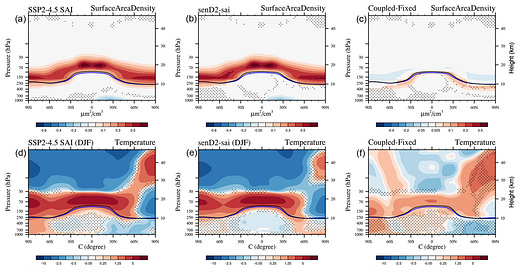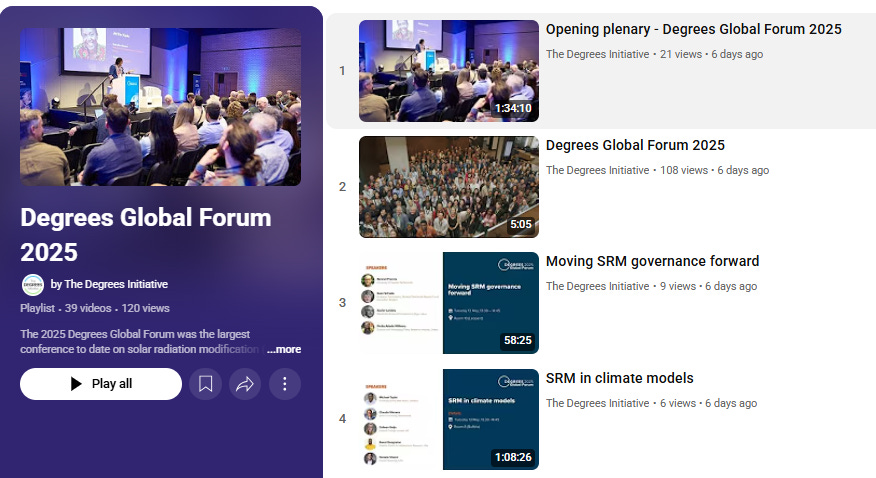Weekly Solar Geoengineering Updates (16 June - 22 June 2025)
Weekly SRM roundup of research papers, web posts, events, jobs, projects, podcasts, videos and much more.
1. This Week’s Top SRM Highlights
2. Research Papers
3. Thesis
4. Web Posts
5. Call for Abstract
6. Job Opportunity
7. Upcoming Events
8. YouTube Videos
RESEARCH PAPER: Stratospheric aerosol injection can weaken the carbon dioxide greenhouse effect (Communications earth & environment)
RESEARCH PAPER: Stratospheric Aerosol Intervention experiment for the Chemistry–Climate Model Initiative (EGU)
STATE-LEVEL BAN: New Florida law bans weather modification and geoengineering (Florida's Voice)
WEB POST: Why geoengineering is no longer a complete taboo for scientists (New Scientist)
PLAYLIST: Degrees Global Forum 2025 (The Degrees Initiative)
RECORDING: E-petition debate relating to geo-engineering and the environment (UK Parliament)
Read on to unpack more updates:
Assessing changes in atmospheric rivers under stratospheric aerosol injection using ARISE-SAI-1.5
Authors: Kwesi Twentwewa Quagraine, Travis Allen O'Brien, Kwesi A Quagraine, Ben Kravitz and Simone Tilmes
Synopsis: Under warming scenarios, this study compares future changes in atmospheric rivers (ARs) under SSP2-4.5 and Stratospheric Aerosol Injection (SAI-1.5). SAI reduces inland AR reach, high-impact ARs, and extreme AR-driven rainfall, while boosting beneficial precipitation. AR frequency rises in Northern Hemisphere oceans under SAI but drops in the Southern Hemisphere. These contrasting impacts underscore the need for more research before using SAI in global water cycle policy.
The effect of solar radiation modification on agroclimatic indices in Africa
Authors: Temitope Samuel Egbebiyi, Vincent Ajayi, Ayomide Arowolo, Jeremiah Ogunniyi and Samuel Ogunjo
Synopsis: This study explores how SRM via Stratospheric Aerosol Injection (Gsulfur) and Solar Dimming (Gsolar) may impact African agriculture under future climate scenarios. Both methods reduce warming but have mixed effects on rainfall—boosting it in North Africa while reducing it in Central and East Africa. SRM alters wet days, growing seasons, and agro-climatic indices, posing trade-offs for crop productivity and water security. Results inform climate-smart policy decisions.
Image masks of global ship tracks for NASA MODIS data products
Authors: Pierce Warburton, Kurtis Shuler, Jake P. Zenker & Lekha Patel
Synopsis: Ship tracks—cloud features from ship exhaust—offer key evidence of aerosol-cloud interactions (ACI), relevant for SRM. This study introduces a hand-labeled dataset of ~2,500 ship tracks from MODIS Aqua imagery, capturing contours, emissions, and dispersion. The dataset enables machine learning and climate model validation, supporting broader analysis of ACI effects that are currently underrepresented in models.
Stratospheric aerosol injection can weaken the carbon dioxide greenhouse effect
Authors: Haozhe He, Brian J. Soden, Gabriel A. Vecchi & Wenchang Yang
Synopsis: This study explores using absorptive aerosols in the upper stratosphere (~10 hPa) to weaken the greenhouse effect by enhancing infrared emission, offering a potential climate intervention more efficient than traditional scattering aerosols. Model simulations suggest this method could reduce global temperatures up to ten times more per unit mass. Though idealized and lacking real-world constraints, the findings highlight a novel SRM mechanism needing further research into risks and impacts.
Stratospheric Aerosol Intervention experiment for the Chemistry–Climate Model Initiative
Authors: Simone Tilmes, Ewa M. Bednarz, Andrin Jörimann, Daniele Visioni, Douglas E. Kinnison, Gabriel Chiodo, and David Plummer
Synopsis: A new SAI experiment under CCMI-2022 uses a fixed aerosol distribution and sea surface conditions to isolate stratospheric impacts across models. It enables clearer attribution of inter-model differences in chemistry, radiation, and dynamics. Using WACCM6, the study compares this setup with a fully coupled model to separate ocean influences. Results confirm SAI’s role in driving winter North Atlantic Oscillation shifts and Eurasian warming, aiding future ozone and climate impact assessments.
Authors: Kayode Philip Adenuga
Synopsis: This study examines how solar geoengineering and climate scenarios affect net radiation across West Africa using ERA5, ARISE-SAI, CMIP6, and historical datasets. Findings show climate models underestimate net radiation, with strong cooling in arid zones and moderate cooling in humid areas. Seasonal patterns, cloud cover, and circulation drive spatial differences. Results highlight the need to correct model biases and assess geoengineering trade-offs for better climate resilience in West Africa.
Authors: Hannah J. Rubin
Synopsis: This research uses mapping to analyze three key climate-related phenomena—acid deposition, heat waves, and soil organic carbon—while improving methods and addressing uncertainties. It updates global acid deposition budgets and tracks sulfur fallout from stratospheric aerosol injection using GeoMIP models. Heat wave risks in the U.S. are assessed using both dynamic and statistical downscaling. SOC trends from the 1980s onward are mapped via machine learning. Together, these efforts highlight climate risks and modeling needs.
The Guardian - Researchers call for urgent exploration of methods to cool Earth
New Scientist - Could reusable rockets make solar geoengineering less risky?
SRM360 - SRM Research in Africa Is Not Neo‑Colonial Experimentation
My Joy Online - AbibiNsoma Foundation and FIDEP Foundation call for democratic oversight of emerging climate technologies, supports global non-use agreement on Solar Geoengineering
Globe Gazette - Opinion Column: Why is geoengineering not forefront in climate change discussion?
SRM360 - Outdoor SRM Experiments
SRM360 - UK Parliament to Debate a Petition on Making Geoengineering Illegal
Florida's Voice - New Florida law bans weather modification and geoengineering
House of Commons Library - E-petition debate: Geoengineering
Call for Abstract for AGU 2025 - Session: Advances in Climate Engineering Science | Submission deadline: 30 July 2025
Mechanical Engineering Technician at Arctic Reflections | Delft, Netherlands
"Arctic Reflections is a pioneering Dutch initiative dedicated to preserving Arctic sea ice by pumping water onto the ice in winter."
24 June | Online - Ethical Guidelines for SRM Research: Legitimacy, Recognition, and Procedural Justice by Co-Create
26 June 2025 | In-Person (Canada) & Online - Solar Geoengineering: A Radical, Frightening & Hopeful Response to Climate Change by Cascade Institute
26-28 June | Cambridge UK - Artic Repair Conference 2025 by University of Cambridge & Center for Climate Repair
27 June 2025 | Online - Climate Intervention Virtual Symposia#19 (NEW)
04 July | UK - Exeter Climate Conference (2 - 4 July 2025)—Plenary 5: Geoengineering and the concept of responsible climate intervention
04-05 September | Washington DC - 2025 RFF and Harvard SRM Social Science Research Workshop: Governance in a Fractured World
23 October | Helsinki - ATLAS25: Risk Management of Earth System Tipping Points by Operaatio Arktis
3-7 November | Pune, India - 11th WMO Scientific Conference on Weather Modification
15-19 December | New Orleans, Louisiana - 2025 American Geophysical Union Meeting (NEW)
Subscribe to the Solar Geoengineering Events Calendar by adding this link to your default calendar:
https://ics.teamup.com/feed/ks64mmvtit583eitxx/0.ics
"Jeffrey Nielsen is a trained national security strategist with military experience in North America, Europe, West Asia, and East Asia. He researched international climate change security at the US Army's Command and General Staff College before publishing in Oxford Open Climate Change. He will be presenting his recent paper: Nielsen. 2025."
Degrees Global Forum 2025—Playlist | The Degrees Initiative
"The 2025 Degrees Global Forum was the largest conference to date on SRM. Taking place from 12–16 May 2025 in Cape Town, the event brought together researchers, NGO representatives, policymakers, thought leaders, and journalists from around the world to discuss the scientific, social, and political dimensions of SRM."
Climate geoengineering: Planet savers or madcap experiments? | Climate Conversations podcast | CNA
"Money and resources are increasingly being invested in climate geoengineering. Jack Board and Liling Tan debate the science and sense of manipulating the climate to counter global warming."
"The main focus of this video is a type of geoengineering called solar radiation modification or SRM. Within this there are different proposals. One mentioned here is stratospheric aerosol injection, or SAI, and Marine Cloud Brightening, MCB. These techniques aim to reduce the amount of the suns energy that reaches the earth’s surface, thereby helping to cool the planet while efforts continue to reduce carbon emissions worldwide."
E-petition debate relating to geo-engineering and the environment | UK Parliament
"The Petitions Committee scheduled a debate relating to geo-engineering and the environment. Dr Roz Savage MP was asked by the Committee to open the debate. The Government sent a Minister to respond."
Why is the UK trying to 'dim the sun' with solar geoengineering? | Roundtable
"Roundtable is a discussion programme with an edge. Broadcast out of London and presented by Enda Brady, it's about bringing people to the table, listening to every opinion, and analysing every point of view. From fierce debate to reflective thinking, Roundtable discussions offer a different perspective on the issues that matter to you. Watch it every weekday at 15:00 GMT on TRT World."
Adaptive Economy: Geoengineering & Planetary Health | Voices of The Atlas With Djoann Fal
"In this episode, we explore two of the most urgent and controversial climate frontiers shaping our planet's future — geoengineering and planetary health."
Follow us on:
Twitter | Bluesky | YouTube | Substack | Google Group | Podcast 1 | Podcast 2














